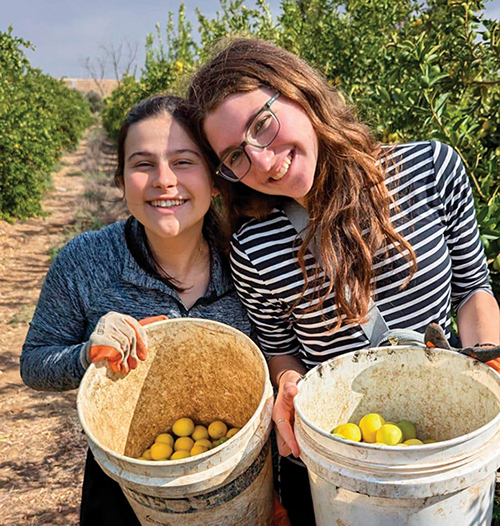
As reservist soldiers continue to leave their families to serve on the front lines of the ongoing war, the young women studying at Midreshet Lindenbaum in Jerusalem are stepping in to provide vital support back home. Balancing demanding Torah studies with hands-on community service, they’ve become a lifeline for Israeli families facing the challenges of war. Whether they’re caring for children of reservists, tying tzitzit for soldiers, or helping farmers harvest crops, the students are answering the call wherever help is needed.
For families navigating the strain of having a loved one away on reserve duty, these small acts of kindness can make a world of difference. “When the students show up with food, offer babysitting, or run kids’ programs, it reminds me that what we’re experiencing isn’t normal—and that we’re not forgotten,” said Yehudit Adler, whose husband has been on reserve duty for nearly 300 days.
Volunteering has long been part of Midreshet Lindenbaum’s programs, including those for overseas students. But helping others has taken on increased urgency and priority since Oct. 7, said activities coordinator Cheryl Burnat. “We’ve always dedicated Tuesday afternoons to volunteering, but the students are doing so much more than that now,” Burnat said. “They’re not just ticking a box; it’s about being present in real ways that count. They’re stepping in whenever and however they’re needed, meeting the community’s needs one family at a time.”
The impact of this work runs both ways, touching not only the families receiving support but also the young women providing it.
For Ella Mordekai, an 18-year-old Midreshet Lindenbaum student from Livingston who attended Rae Kushner Yeshiva High School, volunteering to create a pre-Sukkot kaytana (day camp) for hundreds of children revealed how much they needed extra attention. One little boy clung to her the moment they met, chatting and playing as if he’d known her forever. “His mom asked me to stay close to him, and I could see right away that these kids need time with someone who isn’t juggling a hundred things,” Mordekai said. “With one parent away and the other handling everything, they’re not getting the one-on-one time they so crave.”
On a recent morning, while babysitting for a local family, 18-year-old Bina Newman, a Midreshet Lindenbaum student from Columbus, Ohio, watched as the father said goodbye to his children before leaving for reserve duty. “It was heartbreaking to see,” Newman recalled. “The kids were doing their best to stay strong, but you could feel the weight of what they were going through.”
For Katie Alper, an 18-year-old student from Oceanside, New York, a FaceTime call between a toddler and his deployed father left an impression she’ll never forget. “The baby’s face just lit up seeing his dad on the screen, and it hit me how much these kids are missing out on,” Alper said. “It’s one thing to read about it, but being there in that moment really brings it home.”
Every act of service helps the students build meaningful connections and reflects Midreshet Lindenbaum’s focus on combining learning with giving back. “I’ve always been taught that you’re not complete if you’re just studying all day,” Alper said. “Helping others, especially here, makes me feel like I’m growing as a person in kindness and responsibility.” Newman agreed: “Being here has shown me that it’s one thing to learn about values in the classroom, but another to put them into action. I feel like I’m learning how to live what I believe.”
As they balance Torah study with meaningful chesed, these experiences shape Midreshet Lindenbaum students in ways that extend far beyond their studies. They learn empathy, the importance of community, and the power of showing up when it matters most. Inspired by the families they’ve served, the students now see chesed not just as an act of service but as a lifelong value—one they will carry with them wherever they go.
For some students, chesed has taken forms they never imagined, offering meaning in unexpected ways. Naomi Zaider, an 18-year-old from New Milford, found purpose in tying tzitzit for soldiers. “The demand for tzitzit has been overwhelming,” she said, “and knowing that each one I make is going to someone serving Israel gives me a sense of purpose.” Zaider approaches each piece with care, ensuring the knots aren’t too tight and that the tzitzit will be easy to put on. “I may never see the soldiers who wear them, but knowing I’ve done something to bring them comfort feels incredibly powerful.”
Newman also reflected on volunteering at a lemon farm, where severe labor shortages had made it difficult to keep up with the harvest. “The farmer kept telling us how much he needed more help, and it really hit me how critical this work was,” she said. Unlike previous volunteer work in the U.S., she felt the urgency here. “You can see right away that your help is truly needed—not just for one person, but for the entire community.”












